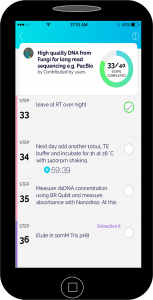Protocols.io Tools for PLOS Authors: Reproducibility and Recognition
Solutions to the challenges of reproducibility in experimental science should be as diverse as the challenges themselves. Inconsistent reagents, barriers to the open sharing of supporting data, experimental variation that goes unrecorded and researcher’s concerns for lack of recognition and credit for novel and meticulously created experimental methods all contribute to the challenges of reproducibility in biomedical research.
PLOS now partners directly with protocols.io to provide authors better ways to share methodological details about their work, practical tools to reduce wasted research efforts and persistent, citable identifiers for laboratory methods. For PLOS, this is a step forward on commitments to address reproducibility and provide improved recognition and credit for all contributions to a work.
“We are delighted to be associated with a like-minded partner such as PLOS,” says protocols.io CEO Lenny Teytelman. “We are aligned in our Open Access ethos, and we strive to facilitate the communication of research in an effective, accessible and reusable way.”
This new offering complements PLOS’ already robust data availability policy, requiring that data underlying the conclusions of an article be made available at the time of publication. Since the strengthening of this policy in 2014, about 60,000 articles have been published that contain a Data Availability Statement.
“We are excited to engage with protocols.io,” says PLOS Executive Editor Veronique Kiermer. “This is another step towards Open Science, facilitating access not only to the data but now also to the laboratory methodology that generated these data.”
How It Works
Researchers are encouraged, at their discretion, to deposit their laboratory protocols on the protocols.io site, obtain a unique DOI and link directly to these from the Methods section of their articles. The unique link allows reviewers and editors access to the protocols during peer review. At the time of publication, the partnership between PLOS and protocols.io ensures that links to and from the published article are established and protocols are automatically made publicly available under a CC BY license for anyone to access, use and cite.

Archived and linked permanently to and from the article, protocols become part of the scientific record. The protocols.io application allows scientists to create, copy, modify and evolve laboratory protocols, describing the critical details of experimental procedures that are often overlooked in articles Methods sections. While detailed steps in a protocol may evolve and improve over time, the version that relates to the published article remains accessible to help explain experimental nuances.
“Methods sections that describe laboratory experiments are narratives that tend to omit subtle variations that may affect the experiments,” says Kiermer. “I hope that scientists will take up the opportunity to describe their methods in a way that is much more useful to others.”
Nuanced methodological details can be shared in new ways, that in time can integrate seamlessly into the research cycle, from bench to publication and back. “It is not merely a tool for publication,” says Teytelman, “it can be useful as a lab tool, at the bench, for record keeping and for sharing expertise within and outside a laboratory.”
Engaged commenting on the protocols.io website allows interested readers to clarify and discuss deeper with others using an article’s methodology. “This partnership will improve reproducibility of published research while fostering scientists’ collaborative engagement with our content,” adds Kiermer.
A DOI for methods, citable by others, provides more granular credit to those individuals contributing to methodological development. It also enables researchers to compare methodological details between laboratories pursuing similar approaches or between published experimental methods and those subtly revised by users. In this respect, protocols.io helps bridge an information gap between published experimental methods and methods refined over time.
PLOS looks forward to authors’ participation in this novel approach to enhancing Methods sections—an Open Access tool to record and share detailed protocols. We hope you try it and let us know your experience via comment below or email to communications@plos.org.
Hero image inset credit (CC BY): Bandage plot of transcripts assembled by J. Mamrot
